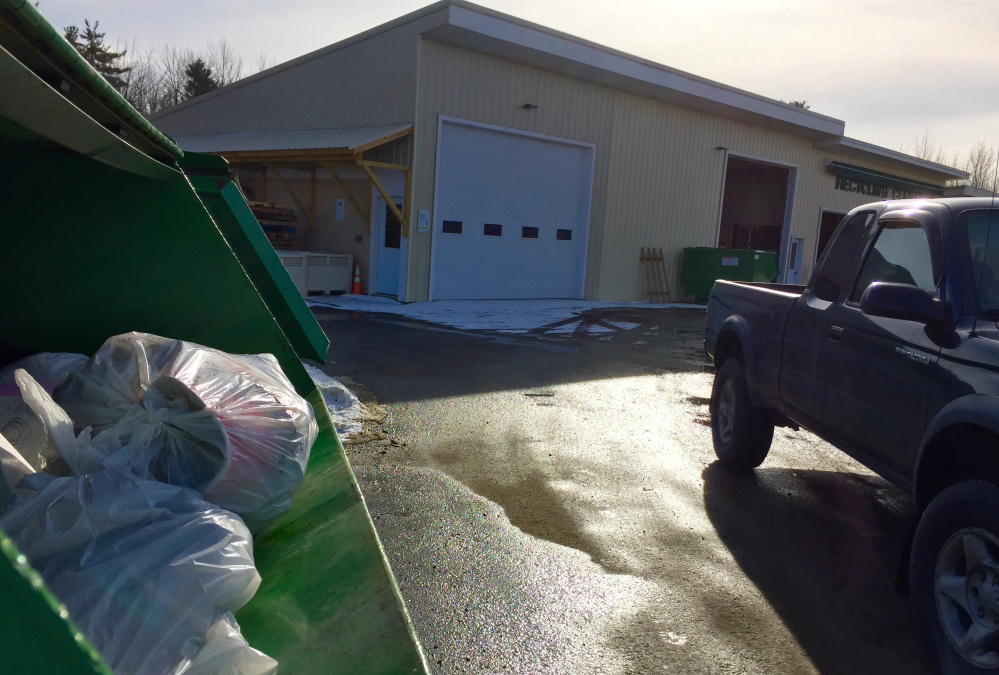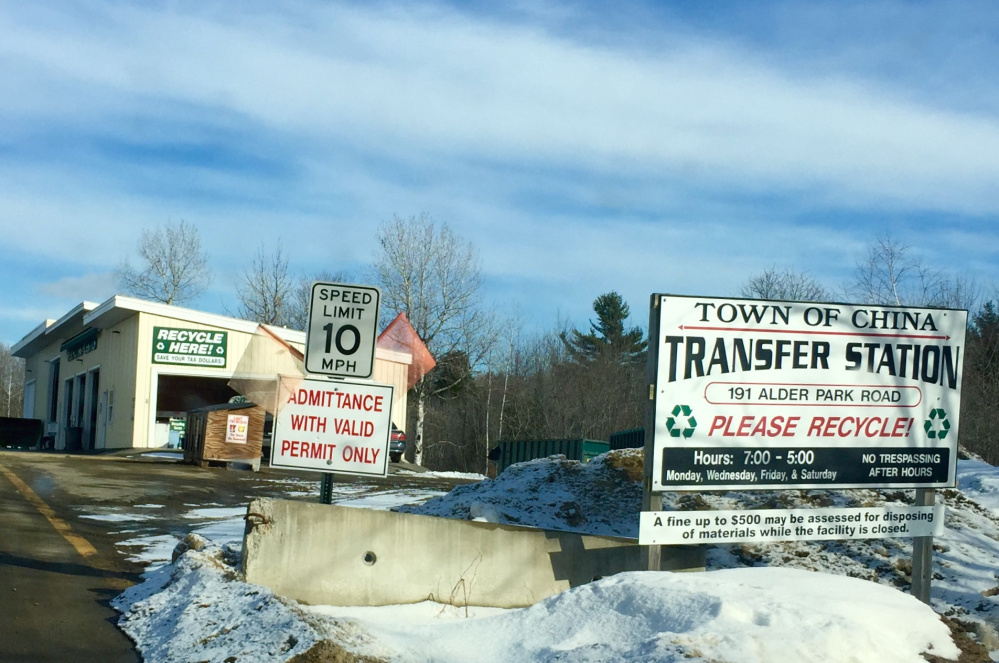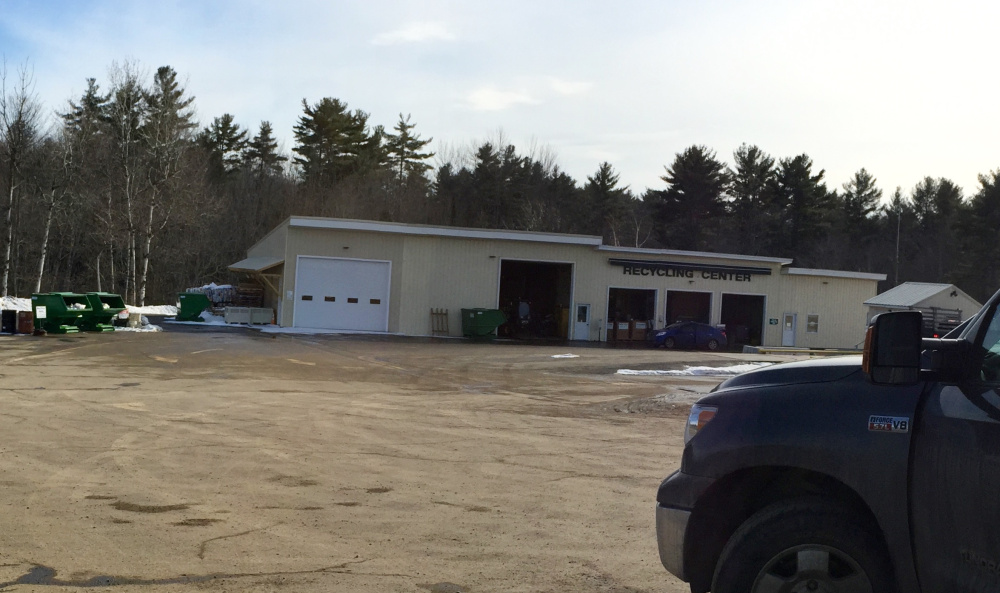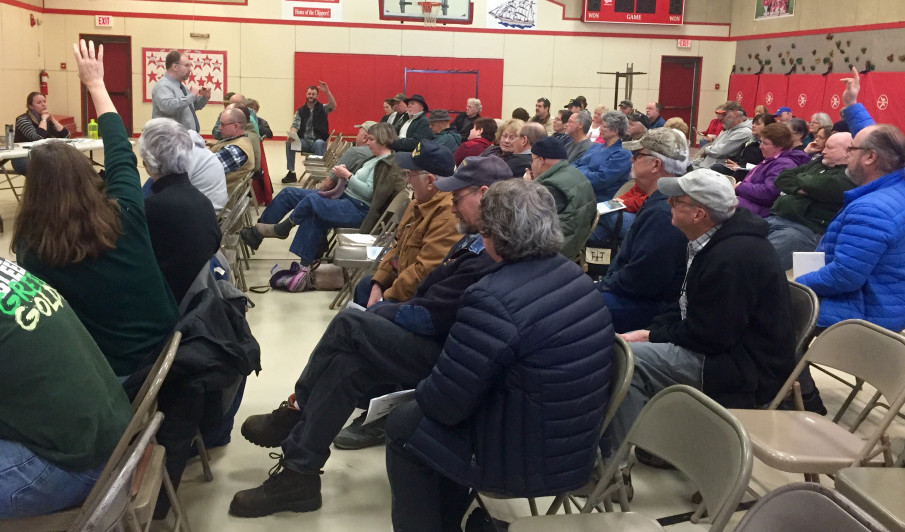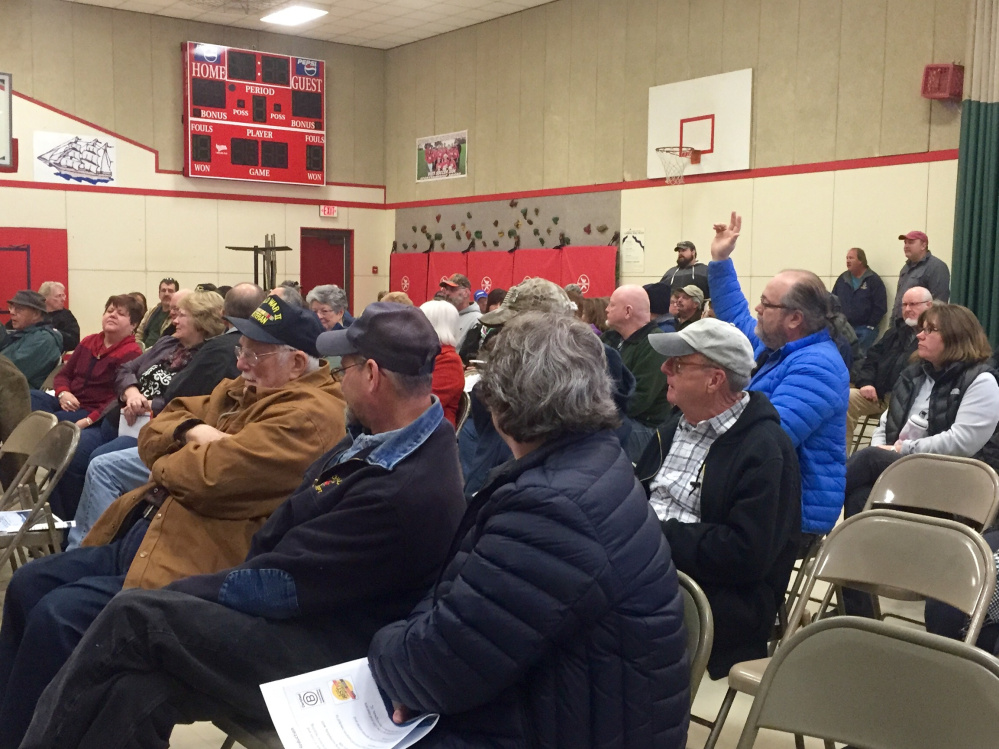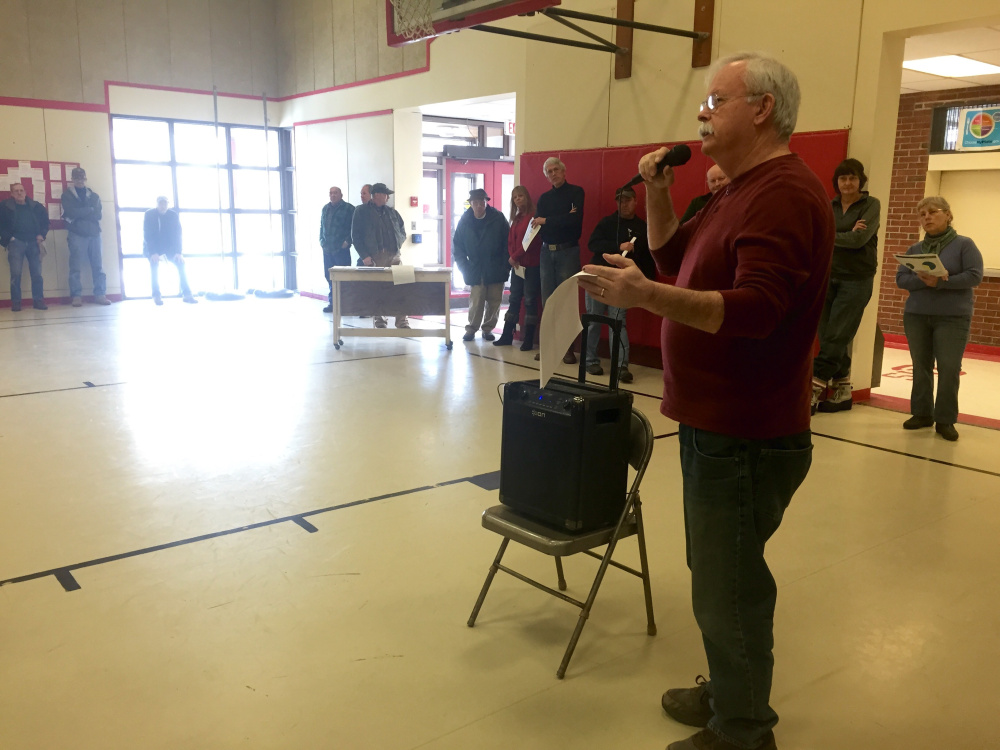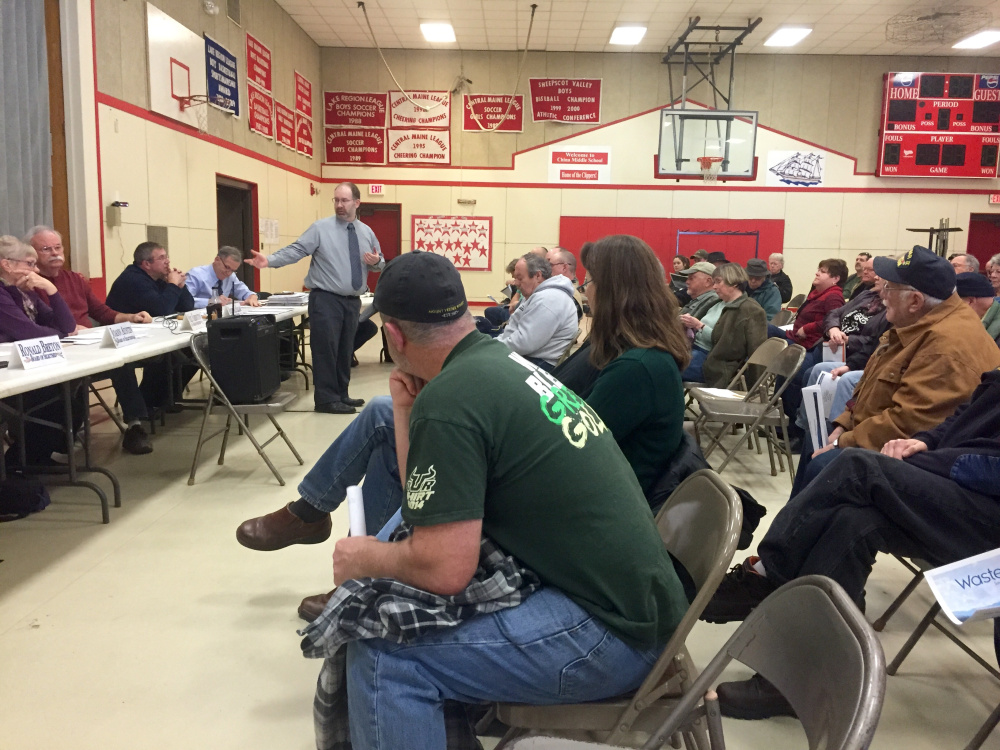CHINA — Residents are leery of the cost and possible trash disposal consequences associated with a mandatory pay-per-bag trash system that will begin July 1 in China.
About 100 China residents gathered for two hours Saturday morning at China Middle School for an informational meeting hosted by the Board of Selectmen on the pay-per-bag system.
A representative from the company China has contracted with to the run the pay-per-bag system, WasteZero, and a representative from the Kennebec Valley Council of Governments who has overseen implementing similar pay-per-bag systems were at the meeting to answer questions.
Selectmen voted last month to implement the program on a trial basis. It will require residents to buy specific trash bags for their garbage in an effort to reduce the cost the town pays annually for garbage disposal, and at the same time to encourage residents to keep their trash levels down by recycling.
Townspeople at Saturday’s meeting expressed concern about the logistics of the rebate program officials have proposed to return some of the bag costs, the possibility of the program spurring illegal dumping and the fact that selectmen are implementing a trial of the program without asking residents first.
Tensions were high at the start of the meeting, with audience members shouting that the program was a “back-door tax” and accusing town officials and WasteZero of “profiteering.” Once the selectmen restored order, Ross Nason, of KVCOG, and Sarah Bernier, of WasteZero, finished their informational presentations and opened the floor for audience questions.
“It’s not as negative as some people in the audience might think,” Selectman Neil Farrington said. “If you have tomatoes (to throw), please wait until the end.”
China resident Elizabeth Campbell said her initial reaction to the pay-per-bag system was “no way,” but she said that she could be swayed if residents were given a detailed cost-benefit analysis of how the rebate system will work.
“It’s odd to open this to questions when we haven’t been given a thorough presentation,” she said. “I would be open to it only if I am going to see a result in my tax bill.”
Farrington is pushing for the pay-per-bag system after seeing a similar program implemented in Etna that included a rebate for residents. “If there is no rebate, I am not for this program,” he said.
The bags will come in three sizes: 30-gallon bags at a cost of $2 each, 15-gallon bags at a cost of $1.75 and 8-gallon bags at a cost of 75 cents.
An informational sheet presented by Bernier states that in the first year of the program, China could save up to $50,000 in tipping and transportation fees, while bringing in $113,000 in revenue from bag sales and additional revenue through recycling.
However, the selectmen did not have detailed figures on how much money would be returned to residents. The town’s plan is to divide the bag sale revenue evenly and return it to taxpayers annually. Only residents who list China as a primary residence would be eligible to get a rebate. Seasonal residents as well as tenants and owners of rental property are excluded from the rebate system.
Residents also worry that by mandating the purchase of specific trash bags, the town will prompt some people to begin dumping their trash illegally around China to avoid the cost of bags.
Sally Brotherton said when she bought her property in China, she cleared three truckloads of trash that was disposed of improperly. Her fear is that the program “just doesn’t seem environmentally sustainable” because it could spur illegal dumping.
“Sometimes programs like these affect the most the people who can afford them the least,” Sally Brotherton said.
Jeff LaVerdiere said he shares Brotherton’s concern about pay-per-bag increasing illegal dumping. LaKerdiere said he is concerned that people might start burning trash or illegally using dumpsters around town to dispose of their trash.
LaVerdiere owns two businesses in China, one of which has a dumpster, where he fears people might start to dump trash. “There is a lot of downside to this,” he said. “I’m going to end up having to lock (my dumpster).”
Originally, Selectmen intended for the pay-as-you-throw proposal to go to voters in a March referendum. But at the recommendation of the Transfer Station Committee, the selectmen decided on a trial period so residents could use the program before voting on it. Residents will vote in November on whether to keep the pay-per-throw program.
Peter Foot, a former selectman, said that the process of implementing the program before the town votes on it “seems a little backwards.”
“If we’re going to change the (municipal solid waste) operations, … we’re going to change the operations of the transfer station, which means we need to change the ordinance.”
Foot’s conclusion drew applause from the audience.
To that, Farrington said residents had not got involved in early discussions of the pay-per-bag system.
“People are listening now,” Farrington said. Residents can “experience recycling for four months and vote it down in November.”
Several residents thanked the selectmen for putting together the informational meeting and welcomed trying the pay-per-bag system.
Lynne OConnor said that while she doesn’t trust government, she would be willing to try the system if the rebate idea works and it reduces the amount of garbage China produces.
“There are no easy answers, and I am willing to pay $2 per bag … to give this a shot, to see if at the end of the year the rebate works,” OConnor said.
Peggy Moran looked to the future for justification that China needs the pay-per-bag system, specifically for the incentive it would give residents to recycle.
“All that stuff you’re throwing away is going to be here for a millennium,” Moran said. “Thank you, all of you, for trying to increase recycling in the town.”
Municipal solid waste volume and its cost have been increasing, and China projects that the cost to process and transport the waste will increase by close to $30,000 a year through 2018. Town officials have said the pay-per-bag plan would reduce China’s waste by 30 percent and increase its recycling by 200 tons annually.
A second informational session on the pay-per-bag program is scheduled for 10 a.m. Feb. 27 at the American Legion Hall in South China. A third meeting is scheduled for 6:30 p.m. March 17 at China Middle School.
Lauren Abbate — 861-9252
Twitter: @Lauren_M_Abbate
Send questions/comments to the editors.

